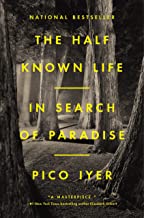The Half Known Life: In Search of Paradise by Pico Iyer 2023
Iyer is a fascinating character in addition to being a superb writer. Born in Oxford to Indian parents who were studying there, he grew up in Oxford and Santa Barbara, CA and was educated with two firsts in English Literature from Oxford and an MA from Harvard. When not traveling around the world, he lives in Japan with his Japanese wife and her two children. He is widely sought as a speaker on spirituality, travel, and writing. I’ve read and enjoyed two of his earlier books.
This book continues Iyer’s search for meaning in this life, visiting places with deep spiritual histories and roots. Iran, Jerusalem, Belfast, Tibet, Kashmir, Varanesi, Sri Lanka, Broome, Australia, and the mountain cemeteries and temples in Japan are included in these travels as he explores a phrase from Herman Melville’s Moby Dick: “In the soul of man there lies one insular Tahiti, full of peace and joy, but encompassed by all the horrors of the half-known life“. Iyer continues: “Cast off from the protected world, he’d gone on, and “thou canst never return.”
Iyer explores this tension between the peace and joy of paradise and the horrors of the real world, the tension between the paradise of the Garden of Eden and the ‘scenes that memory softens and gilds’ and the suffering that is inevitable in this world that ends for each of us only with death. And death is front and center in every page of this book.
Iyer’s exploration has gone on for decades as he has often spent time with the Dalai Llama as well as visiting a retreat in Big Sur four times a year, but the most intense experiences for him have been these travels to sites where centuries of history have identified places as spiritually important. Sadly, everywhere he has gone he finds mostly the ‘horrors’. Jerusalem’s endless conflicts between the great religions (he even cites the ladder we saw at the Church of the Holy Sepulcher and the conflict between the Copts and the Ethiopian clerics on the roof of the Church that we walked through), the stench and pollution of India’s most holy city, Varanesi, the hostility from the Aborigines in Broome, Australia, the endless civil wars between the Tamils and the Sinhalese on Sri Lanka, and on and on. Everywhere there is suffering, pain, and ultimately death.
He never defines the ‘half known world’ so I’m left to speculate that it refers to the most commonly shared human experience of suffering and loss. The other half which is what Iyer seeks is the paradise of the examined life, the life in which suffering is acknowledged as inevitable but managed through meditation, equanimity, compassion, and kindness. Buddhism is front and center in this approach while Judaism with its angry God of the Old Testament and Christianity with its Crusades and colonialism that followed the New Testament don’t fare as well. The other ‘half-known world’ could also refer to death, that experience from which nobody returns to share and reflect upon. At one point, Iyer cites a scholar of Varanesi who states that death is not the opposite of life, rather it is the opposite of birth, the entrance to the other half of the world.
At the end of the day, I found this book to be too non-linear for me, a bit of a jumble but perhaps that is inevitable as one travels the globe searching for meaning. Iyer quotes Milton’s ‘Paradise Lost’ in which Adam is tasked with finding a “paradise within thee, far happier”. This, I believe, is Iyer’s message after all of his travels and explorations of different faiths and spiritual locations: “...each of us has the capacity, through the discerning use of our minds, to see past some of our ignorance and come to terms with life as it is.” or in the words of a Zen teacher Eido-roshi, “The struggle of your life is your paradise.”
Iyer shares a story about the Dalai Llama who was asked what to do about the pain and frustration that results from the gap between one’s dreams and reality. His response: ‘Wrong dream’. This is not an easy read but it’s a thought-provoking one, especially for those of us nearing the final chapter and still searching for that paradise on earth. It was worth the trip.



